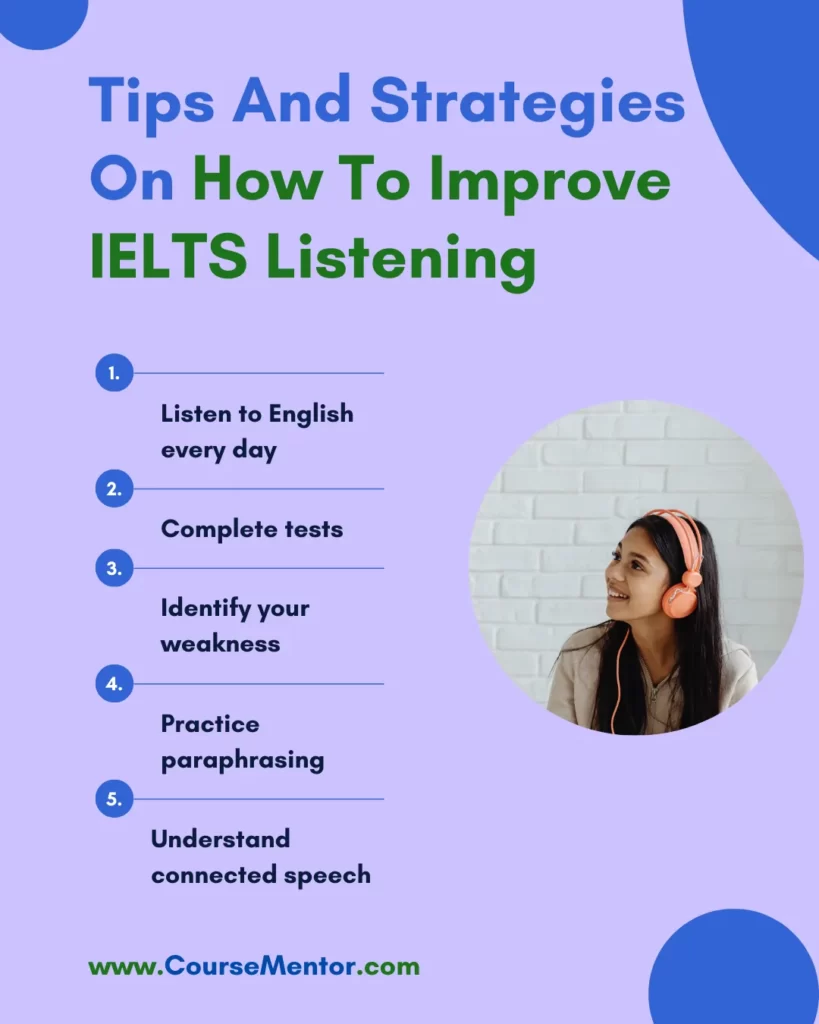If you aspire to study abroad in an English-speaking country, you will be required to provide scores on an English language testing exam to prove your proficiency in English.
There are a lot of English language testing exams in the market. Universities worldwide accept scores of some of the leading exams like the IETLS, TOEFL, PTE, Duolingo test, etc.
The IELTS is the most preferred English language testing exam in India and worldwide. There are many reasons why IELTS is the preferred option of students, but the most prominent is that it is easier than other exams and is feasible to give.
The IELTS tests your language skills based on 4 sections: The reading section, the Speaking section, the Listening section, and the Writing section. All these sections test different abilities and then evaluate your score.
In this blog, I will give you some tips and strategies on how to improve IELTS Listening.
Because many students face difficulty in improving their listening section test scores as they cannot prepare much for this section by reading reference books. But first, you must understand the format of IELTS listening.
Format of the IELTS Listening Section
Before we jump into the tips and strategies for how to improve IELTS Listening, let us first briefly understand the IELTS exam pattern of the listening section and how the questions are asked.
The Listening section of the IELTS exam takes 40 minutes to complete including 10 minutes to transfer your answers.
The Listening section is divided into 4 sub-sections. In all the sections, you will hear a recording, and then you will have to answer some questions related to the recording.
| Section | Time (approximately) | What students will hear |
| Section 1 | 10 minutes | You will hear a conversation between two people. This is set in an everyday context. For example, a telephone conversation between two friends or someone inquiring about an institution. |
| Section 2 | 10 minutes | You will hear a monologue. This is also set in an everyday context, and the topic of the monologue will be about some palace or a facility. |
| Section 3 | 10 minutes | You will hear a discussion between up to four people. It will be related to some educational topic, or it will be a training session. For example, a trek leader explains the flow of events to the trekkers. |
| Section 4 | 10 minutes | The last recording will also be in the form of a monologue; this will be related to a specific academic subject. It will be a recording of a lecture by a professor at a university. |
| Transfer answers | 10 minutes | In these 10 minutes, students can transfer their answers to the answer sheet and review their answers. |
Tips and strategies on How to Improve IELTS Listening
Now that you are clear about the format of the listening section of the IELTS. It is time to share some tips and strategies.
These tips and strategies are practical tips that you can use in your daily life. This will be fun to do, and it will also improve your score in the listening section.

1) Listen to English every day
The first tip on how to improve IELTS listening is a very basic yet very important one. Listening to English every day can work as a daily workshop on English if done correctly. All you have to do is to listen to as much English as possible.
The problem with actually making this possible is that most people around us do not speak English exclusively.
Thus, you should lean towards virtual listening every day. Start watching English news channels, English shows, series, and whatever you can find that is English.
You can also choose the news channel of the country you wish to go to so that you can also start to catch the accent.
If it is initially difficult to understand their concept, try watching with subtitles. Do not rely on subtitles; use them only when you do not understand something.
Apart from news channels, you can also listen to podcasts and radio if you are not interested in news.
There are podcasts related to different genres, so you can start listening to those related to the genres you are interested in.
Make it a habit to listen to English for at least 1 hour daily. This will strengthen your listening and understanding skills. This will also help you to know new words and increase your vocabulary.
2) Complete tests
This is the other most important step for how to improve IELTS listening. Many students do not give tests for the listening section as they think it is easy and they can easily tackle it directly in the exam.
But this is not the case, the listening section can reduce your score if you have not prepared for it correctly. I strongly recommend you give a listening test daily to master your specific listening skills.
When you take the test, you will be able to identify what skills are specifically required to improve your marks.
When you give the mock tests, try to identify what are the skills that the examiners are identifying and evaluating. Try a trial-and-error method. This is time-consuming, but it will give you definite results.
Another thing to remember while giving tests is to ensure you only take authentic tests. This is also an important tip for how to improve IELTS listening.
The authentic tests mimic the exact real nature of the exam, giving you an insight into the questions.
You can also buy some Cambridge IELTS books that have an audio CD for speaking and listening sections to practice to improve your skills.
These CDs contain immense knowledge and tips from Cambridge experts who have years of experience in the field.
3) Identify your weakness
If you keep listening to English all day and practice tests continuously without finding your weaknesses, then all this is useless. All the tips and strategies are to help you find your weakness and work on them.
Thus, the third tip for how to improve IELTS listening is to identify and tackle your weakness. You can look at the answers to your tests and analyze what is going wrong and where you are falling low.
There might be one or more reasons that are mentioned below, why you are facing the problems:
- Most of the time, your grammar lets you down while answering listening questions. You maybe answer a past tense situation heard in the recording while the answer demands in the future or the present tense. These are silly mistakes that reduce your overall score. You can tackle this by strengthening your grammar base with some basic grammar books.
- The other reason may be that you are falling short on vocabulary. You may not understand many words as they are new to you. Practice improving your vocabulary by reading some reference IELTS books for vocabulary.
- One more reason which might be reducing your marks is that you might be simply finding it hard to follow the conversation. The speed of the conversation may be too fast for you. Try to tackle this by constantly listening to English daily and taking more tests.
4) Practice paraphrasing
Students often do not understand the meaning of some basic sentences in the recordings that were paraphrased just to confuse them.
Paraphrasing is nothing but slightly changing the sentence’s tone by using some synonyms and keeping the meaning the same.
You might have difficulty understanding these paraphrased sentences, but when they are converted to simpler ones, they are easy to understand.
Try to practice paraphrasing normal sentences; once you master this art of paraphrasing, then it will be easier for you to decode paraphrased sentences.
To follow this tip on how to improve IELTS listening, you can rely on listening to podcasts as you can easily stop or start them. Stop the podcast from time to time and try to paraphrase the sentences that were used in it.
5) Understand connected speech
The last tip on how to improve IELTS listening is to understand connected speech and accents. This is the problem faced by many non-native speakers.
Connected speech is when the words and sounds are mixed, making it difficult to understand what is being told.
These are more when the recordings are from a non-UK origin. The speech in America and Australia is slightly non-clear.
For example, “What are you going to do” turns into “Whadya gonna do” Similarly, “Come on. Let’s get to the park.” it turns into “Comon. Let’s getete park.”
This type of speech often confuses non-native speakers, and they often answer a question incorrectly. The only solution to this problem is to listen to this type of native speech repeatedly to familiarize yourself with it.
Conclusion
The Listening section of the IELTS may seem easy from the outside, but it requires a special approach and hard work to tackle the type of questions that are asked in it.
Especially being a non-native speaker is a disadvantage in understanding native accents and vocabulary. The above given 5 tips on how to improve IELTS listening are the most practical tips possible.
I would recompose you and make them your daily habit. This will surely improve your listening score.
If you need guidance related to the IELTS exam or still have any queries related to the blog, then contact our experts.
If you like this blog and want to read more blogs related to this, then keep visiting CourseMentor™.
FAQs
What skills are tested in the IELTS Listening test?
The IELTS Listening test measures a variety of skills, including your ability to listen for specific information, identify the main ideas and supporting details, understand what the speaker wants to explain and follow a conversation or lecture.
How is the IELTS Listening test structured?
The IELTS Listening test consists of 4 sections, each with ten questions. You will listen to various recordings, such as conversations, monologues, and lectures, and answer questions after hearing the recording.


